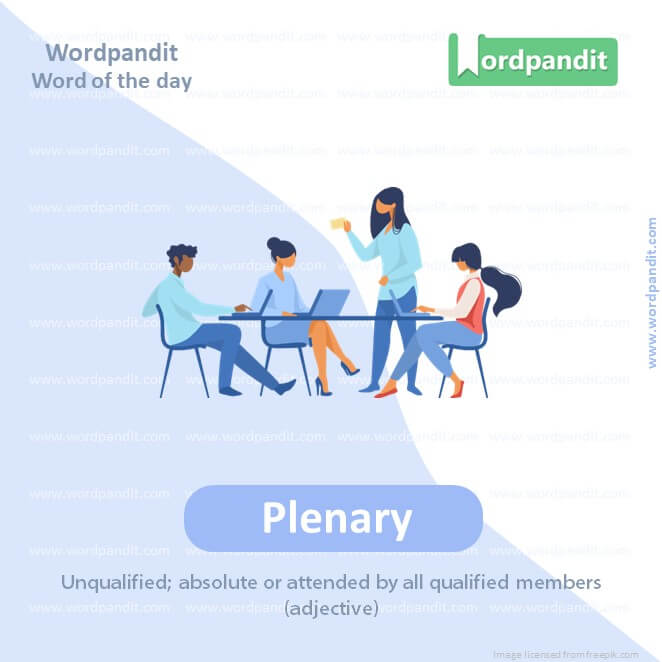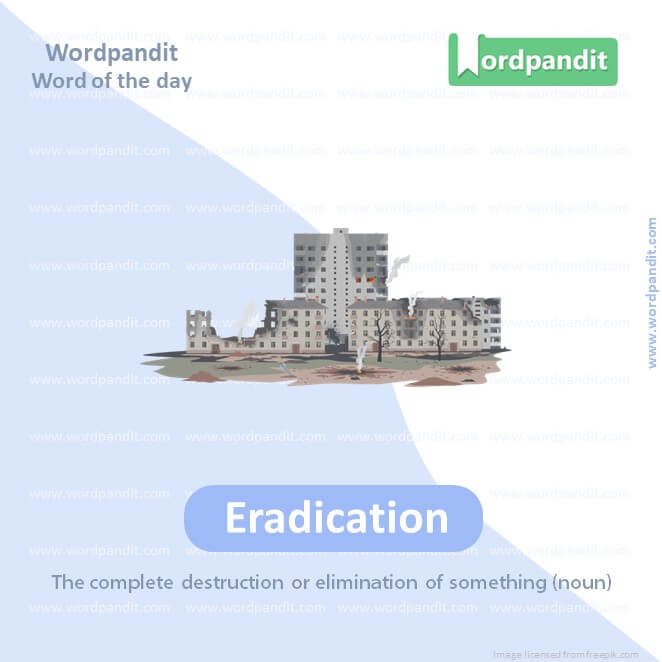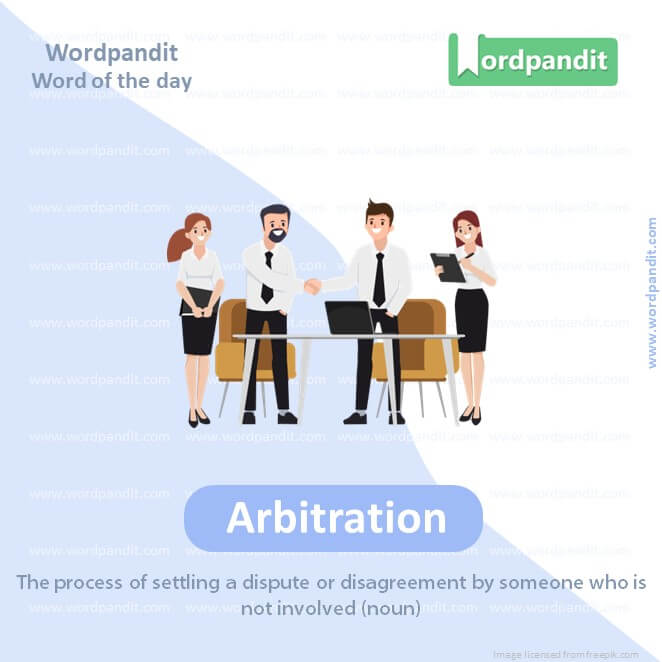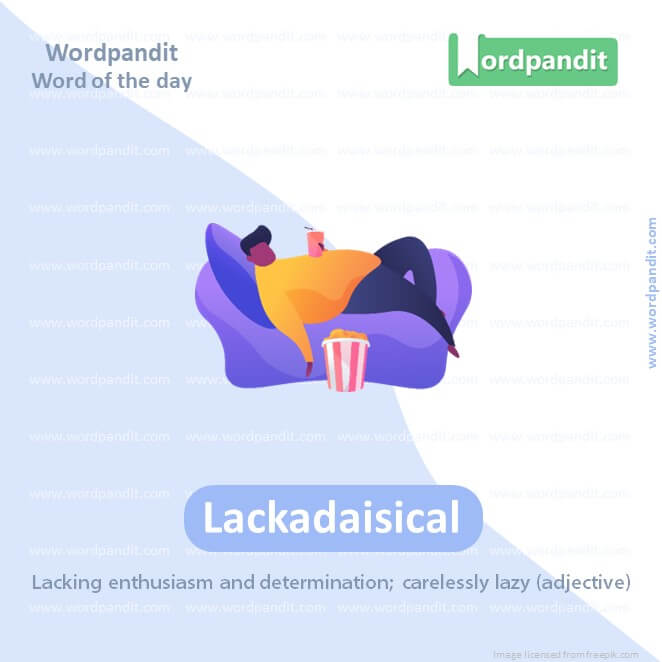Daily Vocabulary Words: List of Daily Used Words in Leading Indian Newspapers
Hi there. Welcome to this special section @ Wordpandit. Our endeavour here is straightforward: highlighting daily vocabulary words that you would come across in leading newspapers in the country. We have included the following newspapers in our selection:
• The Times of India
• The Economic Times
• Hindustan Times
• Mint
• Indian Express
We are putting in extensive work to develop your vocabulary. All you have to do is be regular with this section and check out this post daily. This is your repository of commonly used words; essentially, we are posting a list of daily used words. Hence, this has significant practical application as it teaches you words that are commonly used in leading publications mentioned above.
Visit the website daily to learn words from leading Indian newspapers.
WORD-1: Adaptation
CONTEXT: A paradigm shift in the climate regime is needed for adaptation. There is a need to peg vulnerability from being viewed in terms of the country.
SOURCE: Hindustan Times
EXPLANATORY PARAGRAPH: Adaptation is like when you change something to make it work better in a different place or situation. It’s like wearing warmer clothes in winter to adjust to the cold weather.
MEANING: The process of changing to suit different conditions or a new environment (noun).
PRONUNCIATION: ad-ap-tay-shun
SYNONYMS: Adjustment, Modification, Alteration, Change, Transformation, Conversion
USAGE EXAMPLES:
1. The movie was an adaptation of a famous novel.
2. Plants undergo adaptation to survive in harsh climates.
3. The adaptation of the play for television was successful.
4. Animals show remarkable adaptation to their environments.

WORD-2: Plenary
CONTEXT: On the floor of the closing plenary, many lauded this as a historic achievement since it continued to preserve the 1.5 degrees Celsius temperature target and mentioned transitioning away from fossil fuels. From a developing country’s perspective, adaptation is as crucial as mitigation.
SOURCE: Hindustan Times
EXPLANATORY PARAGRAPH: Plenary is when everyone or everything that should be there is present. It’s like when every single student is in class for a big meeting.
MEANING: Unqualified; absolute or attended by all qualified members (adjective).
PRONUNCIATION: plee-nuh-ree
SYNONYMS: Full, Complete, Unrestricted, Unconditional, Total, Entire
USAGE EXAMPLES:
1. The committee made a plenary decision.
2. The conference included plenary sessions with all members present.
3. She had the plenary authority to sign the contract.
4. The plenary meeting was attended by all delegates.
WORD-3: Mitigation
CONTEXT: On the floor of the closing plenary, many lauded this as a historic achievement since it continued to preserve the 1.5 degrees Celsius temperature target and mentioned transitioning away from fossil fuels. From a developing country’s perspective, adaptation is as crucial as mitigation.
SOURCE: Hindustan Times
EXPLANATORY PARAGRAPH: Mitigation is like trying to make a problem less bad. It’s like putting a band-aid on a small cut to help it feel better.
MEANING: The action of reducing the severity, seriousness, or painfulness of something (noun).
PRONUNCIATION: mi-ti-gay-shun
SYNONYMS: Alleviation, Reduction, Diminution, Relief, Lessening, Moderation
USAGE EXAMPLES:
1. They discussed strategies for the mitigation of environmental damage.
2. Mitigation measures were put in place to reduce noise.
3. The court considered her cooperation as a factor for mitigation.
4. Flood mitigation efforts helped to prevent further disaster.

WORD-4: Eradication
CONTEXT: The GGA, as agreed in Dubai, includes 11 targets to be achieved by 2030. Seven pertain to sectors and themes such as water, agriculture, health, biodiversity, human settlements, poverty eradication, and cultural heritage.
SOURCE: Hindustan Times
EXPLANATORY PARAGRAPH: Eradication is like completely getting rid of something so that it’s not there anymore. It’s like cleaning your room so well that not even one speck of dust is left.
MEANING: The complete destruction or elimination of something (noun).
PRONUNCIATION: ih-rad-ih-kay-shun
SYNONYMS: Elimination, Extinction, Removal, Annihilation, Extermination, Abolition
USAGE EXAMPLES:
1. The eradication of smallpox was a major achievement in medicine.
2. Efforts are being made for the eradication of poverty.
3. The government launched a campaign for the eradication of illiteracy.
4. Eradication of invasive species from the island is a priority.
WORD-5: Nuances
CONTEXT: While the approach in climate crisis negotiations will be country-driven, the GGA indicator framework needs to factor in nuances and disaggregate the picture of vulnerability within countries.
SOURCE: Hindustan Times
EXPLANATORY PARAGRAPH: Nuances are the small differences in things that might seem the same at first. It’s like noticing the different shades of blue in the sky.
MEANING: Subtle differences or distinctions in expression, meaning, or response (noun).
PRONUNCIATION: noo-ahn-ses
SYNONYMS: Subtleties, Shades, Overtones, Distinctions, Refinements, Implications
USAGE EXAMPLES:
1. Her poetry is full of linguistic nuances.
2. He didn’t understand the nuances of local politics.
3. The nuances of her expression were fascinating to observe.
4. The painting captures the nuances of light beautifully.

WORD-6: Arbitration
CONTEXT: Both SC judgments on arbitration law are landmark and authoritative with clarificatory declarations in the arbitration jurisprudence of India.
SOURCE: Hindustan Times
EXPLANATORY PARAGRAPH: Arbitration is like having a fair person help solve a disagreement between two sides. It’s like when a teacher helps two kids decide how to share toys fairly.
MEANING: The process of settling a dispute or disagreement by someone who is not involved (noun).
PRONUNCIATION: ahr-bi-tray-shun
SYNONYMS: Mediation, Adjudication, Conciliation, Negotiation, Settlement, Resolution
USAGE EXAMPLES:
1. They agreed to settle the dispute through arbitration.
2. The arbitration panel made a binding decision.
3. She is an expert in international arbitration.
4. The contract includes an arbitration clause.

WORD-7: Interpretations
CONTEXT: Different jurisdictions across the world have applied the applicability of the group of companies doctrine by applying different corporate law principles and interpretations. In the five judges’ judgment (Cox and Kings Ltd. vs SAP India Pvt Ltd. and Anr), while agreeing with the detailed view of the Chief Justice of India (CJI) DY Chandrachud, justice PS Narasimha, recorded in a separate order that acceptance of this doctrine is “highly contested across jurisdictions”.
SOURCE: Hindustan Times
EXPLANATORY PARAGRAPH: Interpretations are the different ways people understand or explain something. It’s like when different friends tell their own version of a story.
MEANING: The action of explaining the meaning of something or the way something is understood or explained (noun).
PRONUNCIATION: in-tur-pruh-tay-shuns
SYNONYMS: Explanations, Understandings, Readings, Constructions, Renderings, Versions
USAGE EXAMPLES:
1. Different interpretations of the law were discussed.
2. His speech has given rise to several interpretations.
3. The story has many possible interpretations.
4. Artists often have unique interpretations of events.

WORD-8: Lackadaisical
CONTEXT: They can be treated as inputs but no conclusive evidence, the Supreme Court said adding that there is no ground to claim that SEBI has been lackadaisical in its probe.
SOURCE: Hindustan Times
EXPLANATORY PARAGRAPH: Lackadaisical is when someone isn’t putting much effort or energy into what they’re doing. It’s like when someone does their chores slowly and without caring much.
MEANING: Lacking enthusiasm and determination; carelessly lazy (adjective).
PRONUNCIATION: lack-uh-day-zih-kul
SYNONYMS: Listless, Unenthusiastic, Indifferent, Lethargic, Apathetic, Sluggish
USAGE EXAMPLES:
1. His lackadaisical approach to study led to poor grades.
2. She had a lackadaisical attitude towards her job.
3. The team’s lackadaisical performance disappointed the fans.
4. He did his chores in a lackadaisical manner.
WORD-9: Conglomerate
CONTEXT: The Hindenburg allegations of market manipulation led to a massive erosion of the conglomerate’s share prices and market value.
SOURCE: Hindustan Times
EXPLANATORY PARAGRAPH: Conglomerate is like a big group made up of different companies or parts. It’s like if different toy brands were all owned by one big company.
MEANING: A large corporation formed by the merging of separate and diverse firms (noun); or a thing consisting of a number of different and distinct parts or items grouped together (adjective).
PRONUNCIATION: kuhn-glom-uh-rut
SYNONYMS: Corporation, Combination, Amalgamation, Aggregate, Conglomeration, Fusion
USAGE EXAMPLES:
1. The conglomerate owns several different brands.
2. He works for a multinational conglomerate.
3. The museum displayed a conglomerate of historical artifacts.
4. The conglomerate structure of the organization was complex.
WORD-10: Persecuting
CONTEXT: The fact that Trump is facing criminal charges didn’t deter her; instead, the Haitian-American voter saw it as evidence that the system was “persecuting Trump” just like it was persecuting people like her.
SOURCE: Hindustan Times
EXPLANATORY PARAGRAPH: Persecuting is when someone treats another person very unfairly and cruelly, often because of their beliefs or who they are. It’s like bullying someone but much worse and for a long time.
MEANING: Subjecting someone to hostility and ill-treatment, especially because of their race or political or religious beliefs (verb).
PRONUNCIATION: pur-sih-kyoo-ting
SYNONYMS: Oppressing, Harassing, Tormenting, Victimizing, Abusing, Discriminating
USAGE EXAMPLES:
1. They were persecuted for their religious beliefs.
2. Throughout history, many groups have been persecuted unjustly.
3. The regime was known for persecuting its political opponents.
4. She felt persecuted by the constant scrutiny of the media.
Vocabulary Daily
Language learning is a beautiful yet complex dance, where ‘vocabulary daily’ connote the integral beats. These everyday words form the essence of most of our conversations and are the cornerstone of effective communication. However, a methodical approach is required to efficiently learn ‘vocabulary daily’.
One key approach to learning ‘vocabulary daily’ is consistency. Engaging with a few words every day consistently fosters better understanding and recall than sporadic cramming sessions.
Interactive tools can add a touch of excitement and ease to mastering ‘vocabulary daily’. Flashcards, word of the day calendars, language learning apps can make the learning experience fun and fruitful. These tools not only introduce new words but often provide a context of use, aiding your understanding.
Making ‘vocabulary daily’ a part of your daily life is a surefire success strategy. Incorporating these words into day-to-day conversations, writing, or social media interactions greatly enhances retention and usage. It also allows you to witness firsthand the impact of a rich vocabulary on the clarity of expression.
To effectively grasp ‘vocabulary daily’, always keep a learner’s curiosity. Explore books, news articles, music, and podcasts in the respective language. This exposure helps in absorbing the words in a real-world context, thus building a robust bond with ‘vocabulary daily’.
In conclusion, understanding ‘vocabulary daily’ is an ongoing process that necessitates consistency, interactive learning, practical application, and a learner’s curiosity. By following this comprehensive approach, the task of mastering ‘vocabulary daily’ becomes less of a chore and more of an enriching journey that can lead to eloquent and effective communication. So, step into the exciting world of ‘vocabulary daily’ and let it colour your language learning adventure with shades of clarity, confidence, and joy.













